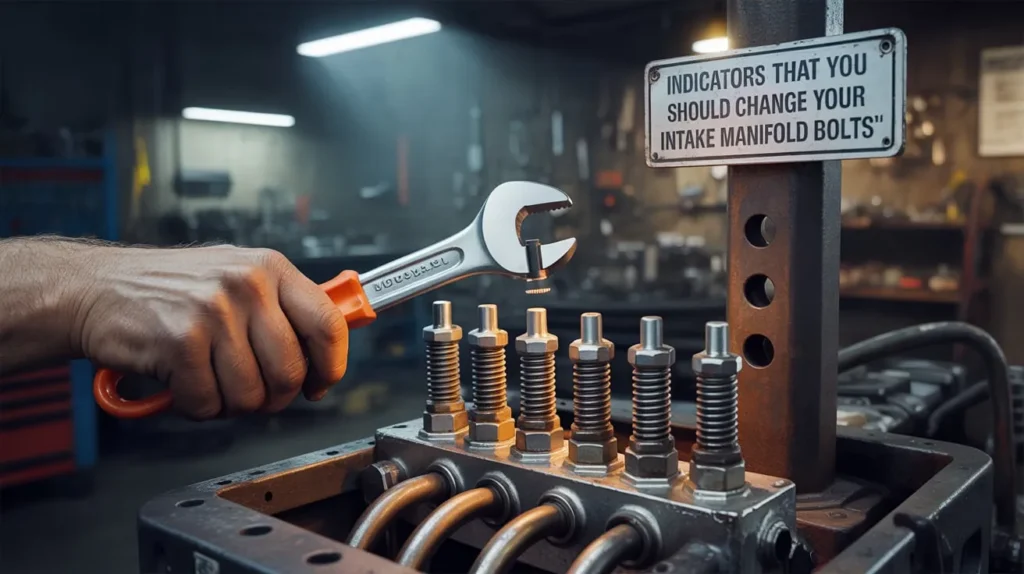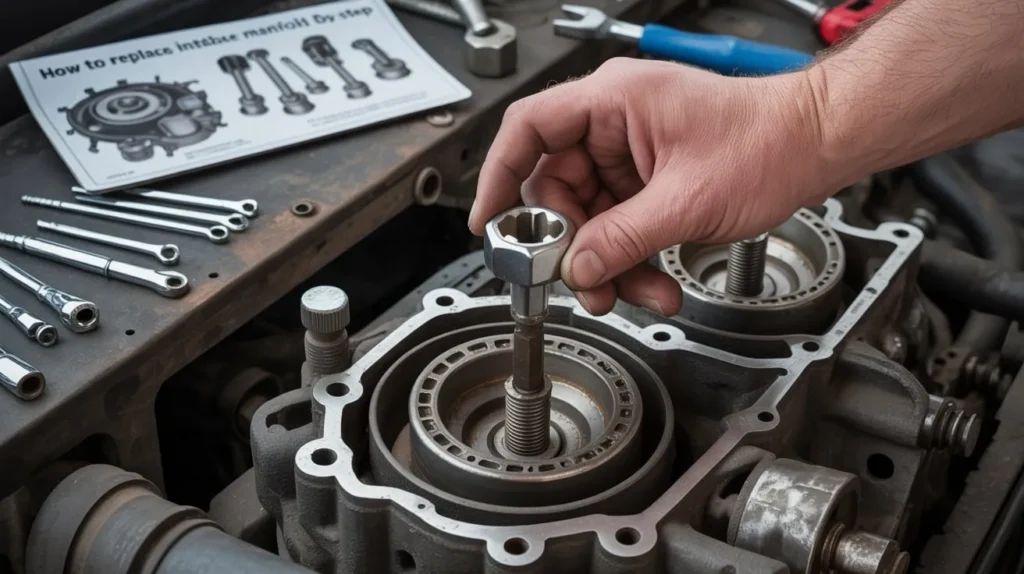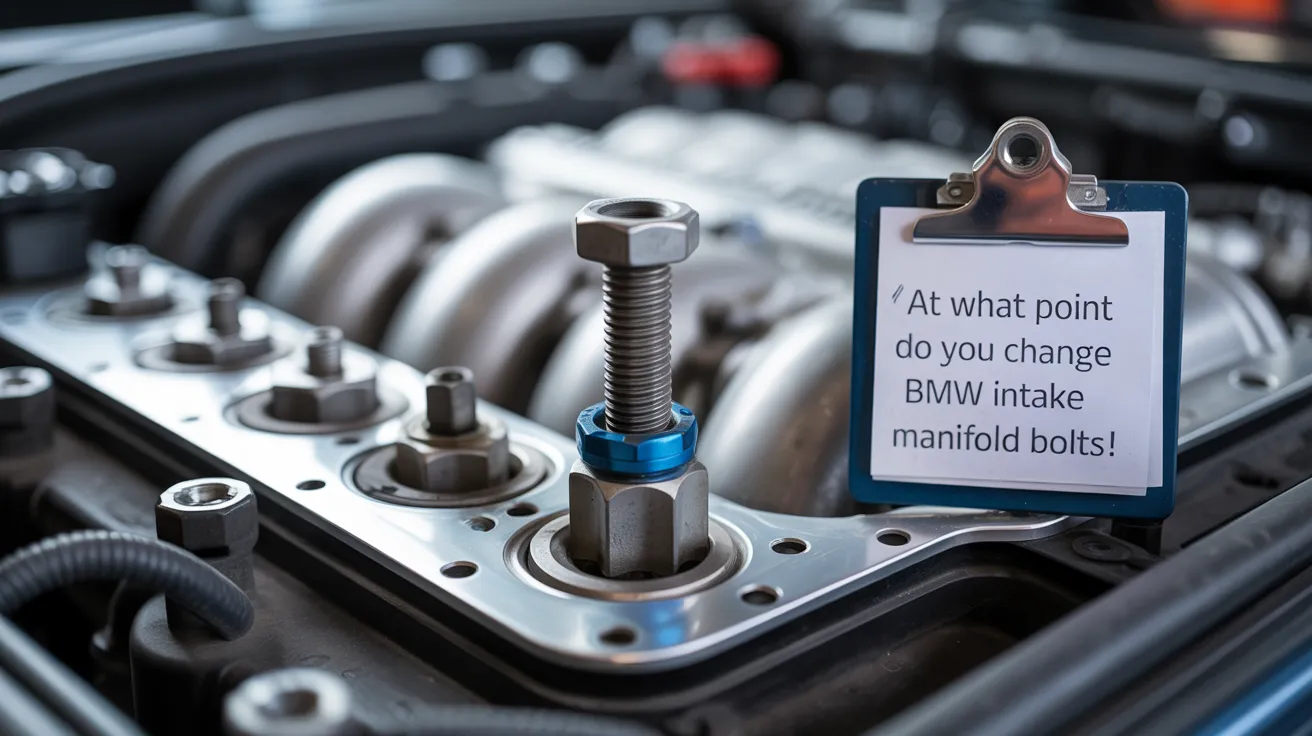Intake manifold bolts are essential parts of the engine assembly of BMW cars, as they play the essential role of fixing the intake manifold to the cylinder head. This relationship is critical because the intake manifold plays a critical role in distributing air and fuel into the combustion chambers of the engine, which has a direct effect on engine performance and efficiency. Automotive experts indicate that these bolts are critical to the proper functioning of the engine since any breakage or wear of the bolts may result in serious operational problems.
Not only can the quality and condition of the intake manifold bolts affect performance, but also fuel economy. These bolts may wear out over time as a result of thermal expansion, vibrational stress, and exposure to other environmental conditions. When the bolts are loose or damaged, this may cause air leaks, which will cause the engine to run inefficiently, which may lead to poor fuel performance and high emissions. Thus, BMW owners are advised to conduct regular checks of these important parts to make sure that their cars remain in the best working condition.
Moreover, it is important to know the suggested maintenance interval of BMW intake manifold bolts to ensure the life of the vehicle. It is important to be aware of any manufacturer-recommended procedures on the replacement of these bolts. Mechanics usually recommend that when doing related services, like replacing the intake manifold or vacuum leaks, the intake manifold bolts should also be replaced to prevent the risk of compromising engine performance. Focusing on these elements when maintaining their vehicles, owners will contribute to the fact that their BMW will work smoothly and efficiently throughout its life.
The Role of Intake Manifold Bolts
Intake manifold bolts are very important in the general operation of an engine. These are special bolts used to fix the intake manifold to the engine block so that the manifold is firmly fixed in place during operation. This safe connection is critical to the best airflow into the engine, which directly affects the performance of the vehicle, its fuel economy, and emissions. In the absence of well-functioning bolts, air leakage may take place, which will result in the loss of engine efficiency and, eventually, damage.
The intake manifolds are made of materials like aluminum or plastic, which provide lightweight and durable construction. These manifolds are usually fastened by bolts of high strength steel alloys, which are designed to resist high stress and temperature fluctuations. This choice of material is critical, because the bolts have to withstand the vibrations and thermal cycling which are part and parcel of an engine. Besides the material properties, the design of these bolts may also incorporate other features like a particular thread pattern and coating that can add to the overall performance of the bolt by increasing corrosion resistance and decreasing friction during installation.
The design of intake manifold bolts is subject to engineering principles that consider clamping force, elongation, and torque requirements. These bolts, when correctly torqued, provide the required clamping force to keep the manifold in place and avoid any movement that may interfere with airflow. However, with time, a number of factors may cause a decline in bolt integrity, including thermal expansion, fatigue, and exposure to the environment, and thus they will require replacement. Both vehicle owners and mechanics need to understand the importance of these parts in the long-term reliability and efficiency of the engine.

Indicators that You Should Change Your Intake Manifold Bolts
Intake manifold bolts are critical in the process of ensuring that the intake manifold is firmly attached to the engine to guarantee optimum performance. But with time, these bolts may show wear and tear and therefore need to be replaced. Visible corrosion is one of the main signs of this problem. In case you observe that the bolts look rusted or damaged, then it is important to consider whether they should be replaced. Air leaks caused by corroded bolts will in turn reduce the efficiency of the engine.
Engine performance problems are another major symptom that indicates the necessity of replacement. When you notice that you lose power or your engine performance varies abnormally, the integrity of the intake manifold bolts may be questionable. A damaged or loose intake manifold may lead to a break in the air-fuel mixture, which will lead to poor acceleration and low throttle response. These performance problems can be in the form of rough idling or stalling which can be annoying to the driver and harmful to the overall vehicle performance.
Also, auditory symptoms can be an indication that the intake manifold bolts need to be replaced. In case you notice a strange hissing or sucking sound coming out of the engine bay, it could be an indication that air is leaking out as a result of loose bolts. These noises may be easily ignored, but they are important signs of engine problems. Professional mechanics will usually advise that you pay close attention to your car in case it exhibits these symptoms because they may cause more serious issues when ignored.
To sum up, the signs that may signal the necessity to change the intake manifold bolts in your BMW are visible wear and tear, engine performance problems, and strange noises. Early identification of these symptoms will help vehicle owners avoid complications and have a smooth engine.
Causes of Intake Manifold Bolt Wear
Several factors may negatively influence the lifespan of intake manifold bolts in BMW vehicles, which may result in their degradation and failure in the long term. It is important that vehicle owners and mechanics understand these factors because it emphasizes the need to maintain and replace the vehicle in time.
Thermal expansion is one of the major factors. The temperature increases greatly as the engine runs, and the metals, including the manifold bolts, expand and contract. This thermal cycling may cause microfractures in the bolts and eventually cause loss of integrity and strength. Consequently, these bolts can over time become ineffective in holding the manifold, leading to performance problems.
Another major cause of wear of bolts is corrosion. The bolts on the intake manifold are usually subjected to oil, fuel and moisture, which is a condition that encourages oxidation and rust. Specifically, moisture that collects around the bolts may cause serious corrosion. This corrosion does not only weaken the bolts but it may also increase the chances of the bolts breaking during maintenance or replacement.
The repercussions of improper torque settings during installation may be long-term on the intake manifold bolts. Every bolt has a certain value of torque that it needs to have in order to have an optimal clamping force. Unless tightened to the manufacturer specifications, it may cause excessive stress or inadequate clamping. This imbalance can accelerate wear or cause failure, which is why accurate installation practices are important.
Finally, the environment is also a significant factor in the durability of intake manifold bolts. Wear and degradation can be hastened by factors like exposure to severe weather or road salt. Also, short trips may cause incomplete engine warm-up cycles, which can cause wear on various engine parts, such as the manifold bolts.
These factors are crucial in ensuring the performance and durability of BMW engines. Monitoring the condition of the intake manifold bolts and dealing with wear issues early enough, car owners can guarantee the best performance of the engine.
Suggested Replacement Periods
As a BMW owner, it is important to know when to replace intake manifold bolts to ensure that the engine performs and lasts long. According to experts, these important parts should be replaced according to certain mileage milestones, which are usually between 60,000 to 100,000 miles. This can differ according to the model and the year of manufacture, and it is recommended to refer to the maintenance manual of the vehicle to get specific recommendations.
Also, high-quality replacement bolts should be used. The OEM (Original Equipment Manufacturer) bolts are commonly used because of their design and reliability. These parts are engineered to resist the stresses of thermal cycles and pressure changes, and that is why it is crucial to follow the recommended replacement schedules to avoid problems in the future. In other cases, a visual inspection can also tell when these parts need to be replaced especially when there are signs of corrosion or wear.
The longevity of intake manifold bolts can also be influenced by environmental factors. As an example, being exposed to corrosive factors, e.g. road salt during winter or other severe conditions, might require more frequent checks and replacements. Consequently, owners in these areas may want to think about an aggressive strategy, which may shorten the replacement cycle to every 50,000 miles.
To conclude, intake manifold bolt replacement and regular maintenance are essential to any BMW owner. Following the recommended intervals as described, quality parts, and environmental factors will help to achieve the best engine reliability and efficiency. To achieve the most successful results, it is advisable to monitor the performance of the vehicle and consult professional services in case of uncertainty about the maintenance requirements.

How to Replace Intake Manifold Bolts Step by Step
Changing the intake manifold bolts in BMW is necessary to ensure that the engine is performing well. To start the process, you should have the tools you need. A socket set, torque wrench, screwdrivers, and perhaps a gasket scraper will be required. It is recommended that you wear safety gloves and goggles to guard against debris and possible engine fluids.
Begin by removing the battery to prevent electrical accidents in the process. Next, disconnect any parts that block the access to the intake manifold, including air intake hoses, throttle body, or sensors. These parts should be labeled and organized to make it easier to reassemble them in the future.
Then, the old intake manifold bolts should be removed carefully, noting their length and location. Since these bolts tend to corrode or loosen with time, it is imperative to check each of them to see whether they are worn out or damaged. In case a bolt is worn out considerably, it is better to replace it with a new one to avoid problems in the future.
After the old bolts have been removed, clean the threads in the engine block so that there is a good seal. Chase the threads with a thread cleaner or a tap, as required. Next, assemble the new intake manifold bolts. Put a drop of engine oil on the threads to make it easier to install and to stop galling.
Position the intake manifold properly and put in the new bolts. It is important that the bolts are tightened in the right order and to the required torque settings. The exact torque and tightening sequence is given in the service manual of the manufacturer; this is essential to prevent warping of the manifold or leakage.
Once you have tightened the new bolts, re-install any parts you had removed. Lastly, connect the battery once again and turn on the engine, looking out to see whether there are any leaks or unusual noises. The effective replacement of the intake manifold bolts will increase the reliability of your BMW and extend the life of the engine.
The Possible Dangers of Ignoring Bolt Replacement
Failure to replace BMW intake manifold bolts may cause many severe engine issues that can cause expensive repairs and poor vehicle performance. These are vital parts that hold the intake manifold to the engine to provide the best air-fuel mixture. The wear or failure of these bolts may cause a variety of problems that undermine the operation of the engine.
Among the main dangers of the worn intake manifold bolts is the possibility of vacuum leaks. The bolts may not hold a tight seal between the manifold and the engine as they become loose, resulting in reduced engine efficiency and loss of power. Vacuum leaks may also lead to unstable idle, sluggish throttle, and high fuel consumption, which eventually reduces the driving experience that BMW cars provide.
Moreover, the effects of neglecting the deteriorating bolt integrity may grow rapidly. An example of this risk was a case study of a BMW model that had its engine severely damaged because of the failure to replace intake manifold bolts. This created a vacuum leak, resulting in a lean air-fuel mixture, which resulted in severe detonation and misfiring that destroyed critical engine parts. These examples highlight the importance of frequent maintenance inspections, as the price of fixing broken engines may be much higher than the costs of preventative bolt replacement.
Professional mechanics underline the necessity to be attentive to the state of the engine parts, especially intake manifold bolts. Wear signs can be detected through regular inspections, e.g. corrosion or stripped threads may be signs of impending failure. Replacing these bolts before they cause serious engine problems can save a lot of trouble and guarantee the durability of the car.
To sum up, the failure to replace BMW intake manifold bolts is quite dangerous. Investing in regular maintenance does not only safeguard the integrity of the engine but also improves the performance of the vehicle.
BMW Intake Manifold Bolts FAQs
1. How can I tell that my intake manifold bolts are going bad?
Indicators of failing intake manifold bolts are abnormal engine sounds, poor engine performance, engine misfires, coolant leakage or vacuum leakage around the intake manifold. Rust, corrosion, or loose bolts can also be observed visually, which means that it should be replaced.
2. Is it possible to change BMW intake manifold bolts by myself?
Yes, you can replace the intake manifold bolts yourself provided you have the right tools, mechanical knowledge and apply the right torque specifications. Refer to the service manual of your vehicle at all times. When you are not sure or have not done it before, it is better to employ a professional mechanic.
3. When do I need to check or change the intake manifold bolts?
It should be inspected regularly as part of routine maintenance, usually every 40,000 to 60,000 miles, or as recommended by the manufacturer. It is recommended that you inspect it immediately after major repairs or when you observe performance problems.
4. What are the tools I require to replace the intake manifold bolts?
A torque wrench, socket set and other hand tools may be required depending on the model of your BMW. To prevent additional engine issues, it is necessary to make sure that you use the right tools and torque specifications.
5. What will be the consequences of neglecting bad intake manifold bolts?
Failure to replace damaged bolts may cause engine misfires, coolant leaks, vacuum leaks, and reduced engine performance. This may lead to more severe damages to the engine and expensive repairs in the long run.
6. Do BMW intake manifold bolts rust?
Yes, the bolts can rust or corrode over time due to exposure to heat, moisture, and engine fluids. Potential engine problems are avoided by regular inspection and timely replacement.
Conclusion: Proper Maintenance is Important
It is important to take care of the intake manifold bolts of your BMW to maintain the best performance and life of your car. These bolts may wear out and degrade over time as a result of heat, pressure, and engine vibrations. Not replacing worn or damaged bolts may cause severe problems like manifold leakage, reduced engine performance, and even engine failure. Thus, it is a crucial part of efficient vehicle maintenance to inspect the intake manifold bolts regularly and replace them in time.
One should be conscious of the symptoms that point to the fact that it is time to change these bolts. Engine misfires, a drop in fuel economy, or apparent leaks around the manifold are symptoms that should be addressed immediately. Preventative vehicle maintenance does not only improve performance, but it also ensures safety on the road. With a strategic approach to maintenance, drivers will be able to avoid small problems that can turn into big repairs, saving time and money in the long-term perspective.
Moreover, it is essential to know the recommendations of the manufacturer and the service periods of the components replacement. BMW cars are engineering masterpieces that demand special consideration to the maintenance schedules. Any vehicle owner should have regular check-ups, which involve assessing the state of the intake manifold bolts. Spending time on the maintenance of your BMW will eventually result in improved performance and reliability.
To conclude, the significance of timely fixing the state of your BMW intake manifold bolts cannot be overestimated. Failure to do this important maintenance may not only interfere with the functionality of your vehicle but also reduce its resale value. Hence, being aware and proactive will make sure that your car will be in top shape in the years to come. You may want to research more or seek the advice of professionals to get detailed maintenance advice specific to your model.

